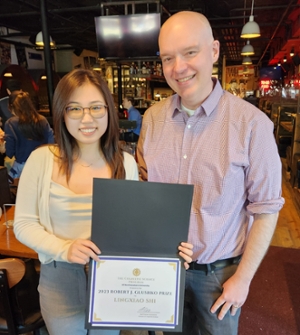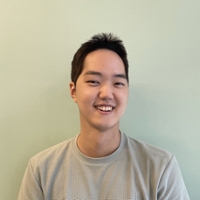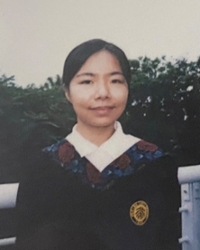News
2023 robert J. Glushko Prize winner
Lingxiao (Lindsay) Shi

(Lingxiao Shi and Dr. Matt Goldrick, Cognitive Science Program Director, at CogSci Fest May 2023)
Lingxiao (Lindsay) Shi was awarded the 2023 Glushko Prize for her outstanding academic achievement in coursework, her work with the Northwestern CogSci Club, and her contributions to our intellectual community through independent research. Working with Dr. Lisa Johnson’s Dynamic Brain Lab, Lindsay investigated the oscillatory neural mechanisms involved in control of working memory. She received several Northwestern grants to support this work, and presented it at both local and national neuroscience conferences.
Advanced fellowship winners 2023-2024
The Northwestern Cognitive Science Program offers fellowship support for graduate students engaged in interdisciplinary research in cognitive science. These three-quarter fellowships are awarded competitively, based on the quality of research proposed, on the candidate's qualifications, and on the interdisciplinarity of the research.
Taewook Kim

- Matt Kay, Computer Science
- Darren Gergle, Communication Studies
Designing a Conversational Agent Providing Emotional Support for Informal Caregivers Suffering from Verbal Agitation of People with Dementia
Informal caregivers, such as family members and spouses, are primary healthcare providers for people with dementia (PwD). The well-being of these informal caregivers directly affects the quality of care they can provide. Unfortunately, they often suffer from verbal agitation of PwD, such as cursing, screaming, and repetitive phrases. Regrettably, there are no existing tools to support the mental health of informal caregivers in home settings. Our preliminary interview study showed that informal caregivers of PwD seek a voice assistant as a social companion providing empathy. However, it is understudied how to convey empathy for informal caregivers of PwD effectively through voice assistants. Hence, we explore how to improve the perceived empathy and reduce the perceived creepiness of a voice assistant for informal caregivers' mental health support. We plan to conduct a within-subject study with 10 informal caregivers to discuss design implications for voice assistants as mental health support.
Zixin Zeng

- Lance Rips, Cognitive Psychology
- Kenneth Forbus, Computer Science
Modeling Intuitive Conceptions of Friction: a Qualitative Reasoning Perspective
People seem to have adequate physics knowledge to deal with most everyday problems, yet even college students in STEM majors are prone to various misconceptions when reasoning about concepts in physics. Specifically, the current project aims to model misconceptions of frictional forces using methods from qualitative reasoning. Qualitative process theory claims that by generalizing from prior experience (protohistories), people can derive intuitions about physical processes by reasoning about qualitative and symbolic representations. I’m interested in looking at (a) whether incorrect generalizations predicted by the qualitative process theory will align with misconceptions documented in psychology experiments, and (b) how such generalizations will evolve as protohistories about frictional forces are accumulated. The current project will bring together methods from cognitive psychology and artificial intelligence to study how physics novices form misconceptions about frictional forces.
Vanessa Zarubin

- Vijay Mittal, Psychology
- Claudia Haase, SESP
Language Development as a Predictor for Long-term Psychosis Vulnerability
Schizophrenia, which affects about 1% of the population, is associated with both positive symptoms (e.g., hallucinations, delusions) and negative symptoms (e.g., cognitive deficits, lack of facial expression of emotion). Signs of risk for developing psychosis are observable prior to the onset of symptoms, and much research focuses on early intervention in adolescence or young adulthood. However, early intervention may not be as effective as prevention. The current project looks at the language produced by pre-school aged children, in particular the complexity of structure and expressions of sense of self, theory of mind (recognizing that others have a different perspective than you), and emotions. Relationships with long-term follow up 5-7 years later characterizing vulnerability to psychosis will be examined. The combination of research in cognitive, developmental, and psychopathology in this project could lead to novel insights improving outcomes for individuals vulnerable to developing psychosis.




